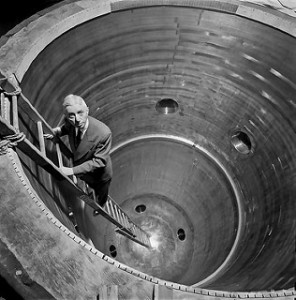Podcast: Play in new window | Download
Subscribe: Apple Podcasts | RSS
 Metallurgical engineer Paul Cantonwine shares insights into the life and career of Admiral H. G. Rickover in this biographical episode of The Engineering Commons podcast.
Metallurgical engineer Paul Cantonwine shares insights into the life and career of Admiral H. G. Rickover in this biographical episode of The Engineering Commons podcast.
- Adam has no interest in being associated with solar FREAKIN’ roadways. (While a cool concept, not everyone believes solar roadways are feasible.)
- Our guest for this episode is materials engineer Dr. Paul Cantonwine, who recently published “The Never-Ending Challenge of Engineering: Admiral H.G. Rickover in His Own Words.”
- As an undergraduate student, Paul figured that since everything was made of materials, he could ensure job security by choosing Materials Engineering as his field of study.
- Our guest began his engineering career at the Bettis Atomic Power Labratory, working with zirconium alloys.
- Neutron cross section refers to the likelihood that, within a given target material, an incident neutron and a target nucleus interact with one another.
- Brian notes that the U.S. Navy’s Virginia-class submarines, and soon-to-be-introduced Ford-class aircraft carriers, are nuclear-powered.
- Our guest finds that keeping the customer in mind helps when making difficult technical decisions.
- Paul found the Rickover biography by Theodore Rockwell to provide great insight into the field of engineering; the book is titled “The Rickover Effect: How One Man Made a Difference.”
- Admiral Rickover was featured on the cover of Time Magazine in January 1954.
- Spending 63 years in the U.S. Navy, the first half of Admiral Rickover’s career was fairly ordinary, notes our guest.
- Although Rickover was an electrical engineer by training, there seems no particular reason he was chosen to attend a nuclear power training course being held at the Oak Ridge National Laboratory in Eastern Tennessee.
- Rickover foresaw the benefits of a nuclear-powered submarine, even when others doubted its technical feasibility.
- Although not a stellar student, Rickover was driven by ambition, an incredible work ethic, and a lifelong love of learning.
- Paul has written that if Admiral Rickover had a mantra to shape a professional culture, it would have been, “I am personally responsible.”
- Every ensign charged with running a nuclear power plant had to interview with Admiral Rickover; none forgot the experience.
- Brian compares Rickover’s interviewing techniques to the job interview scene in the 1997 movie Men in Black.
- One reason for Rickover’s obsession with personnel selection was concern for possible nuclear accidents, a fate which befell the U.S. Army’s Stationary Low-Power Reactor Number One in 1961.
- To test components for shock resistance, Admiral Rickover would throw equipment against a radiator in his office.
- There was no readily available source for pure zirconium when Rickover started developing nuclear components, so he had to develop his own refining plant.
- Admiral Rickover was a man of action, and Paul suggests that today’s engineers can likewise have a significant impact on society if they strive to develop beneficial technologies.
- Our guest can be reached via email: pecantonwine -=+ at +=- gmail dot com
Thanks to the Nuclear Regulatory Commission for use of the photo titled “Admiral Hyman Rickover.” Opening music by John Trimble, and concluding theme by Paul Stevenson.